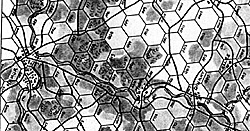 The great Soto Zen master Dogen once said, "If you do any one thing, do it so completely that not one trace of the self remains."
The great Soto Zen master Dogen once said, "If you do any one thing, do it so completely that not one trace of the self remains."
Over a year ago when I approched my good friend Frank Davis about the possibility of doing still another Bulge game, he was not discouraging as one might expect. His only warn ing was that since there were already so many, this one should be significantly better than the others, good enough to be considered "definitive" for some time. Unless it was to be the best, why bother?
This was the premise upon which DARK DECEMBER began. The game must be the maximum fusion of historicity and playability of which I was capable. With my experience in two previous Bulge games, within nine months I was ready to submit my game to Frank for a critical analysis.
The basic result of the sessions with Frank were somewhat startling. Frank was able to zero-in on numerous deficiencies in the design and even in my concepts of the historical situation (which I had been studying on and off for over half a dozen years)! I quickly became dissatisfied with numerous elements of the design.
It is probably easiest to understand game design in terms of literature lor any art). Thus, the artist can be somewhat blind to his own weaknesses, until someone points them out to him or he learns to observe his own work with an objective, critical eye. I had been partially blinded by my own satisfaction with the game and in a sense by the playtesters who seemed to love the game. Unfortunately, not being intimate with the historical situation or the way welldesigned games appear at that stage, they thought it was great.
Rather than resign myself to mediocrity, I began to rework elements of the design that we had identified as problems. Really, there were few changes to the design mechanics, but considerable changes in favor of elegance. This meant structuring the many complex elements in the game so that the Player was not overburdened with memorization.
Elegance does not necessarily mean simplicity: it means a clear definition and contrast of themes, as in Mozart. The game is a complex one, but the important thing is that the game mechanics be realistic in effect and smooth in execution. Otherwise, players may find themselves struggling with the game instead of the situation, as in Jim Dunnigan's BASTOGNE.
The "realism" in game mechanics meant re-reading much of the historical narratives with an eye for everything left 'between the lines." It also meant taking a hard look at the game mechanics as functions of the real situation. How many of the rules were merely game solutions and not really reflections of reality? This had to be corrected.
Though you desire ultimate realism in a game, it's just about impossible to include everything and still have a game. A good example of this is EARLY PACIFIC BATTLES. The designer obviously knows a lot about naval warfare. The real problem, however, is that he does not "design" a game; he just includes everything. Though its content is tremendous, the whole affair doesn't come off well as a coordinated game.
The solution to this problem is to emphasize the elements that you feel are absolutely crucial to an understanding of the battle's outcome. This is the literary theme of the game. In DARK DECEMBER, this theme is the nature of the Blitzkrieg and how it related to the terrain of the Ardennes. Of course, this takes the Player to realize that the Germans are fighting the terrain as much as they are the Americans, certainly a less than ideal situation for a Blitzkrieg.
Content and Focus
The elements of the game design other than the main theme take on a supporting role and in some cases consist of "chrome" to let the historian know that the historical circumstances were taken into consideration by the designer Just as in Zen Buddhist Sumi paintings, what the artist abstracts or leaves out of his creation is as important as what he emphasizes. A game needs balance between content and focus.
I would like to make one observation on the realism in the games, and how seriously we take what we learn from them. Recently, I read a game proposal that would cover the martial arts in a role-playing fashion. The game design would take into account many of the physical styles and techniques along with the differences in the various schools of the actual participants. It sounded pretty convincing.
Unfortunately, I knew better. As a practitioner of Shotokan karate for seven years, it is doubtful to me if a game of any sophistication can approximate the feeling of training or facing an opponent in Kumite. What the designer might do is convince you that you are having an authentic experience. Sadly, this is merely vicarious seduction. Similarly, I doubt if our wargames can really let anyone know what it is like to be in a historical moment. The best we can expect is for the games to give us a sense of what it is like. Beyond that, we need not take ourselves too seriously.
Of course, like other artists, game designers must strive against such difficulty and give their best account. For now, I admit, as far as the Battle of the Bulge is concerned, DARK DECEMBER is mine.
Back to Wargame Design Vol. 1 Nr. 1 Table of Contents
Back to Wargame Design List of Issues
Back to Master Magazine List
© Copyright 1978 by Operational Studies Group.
This article appears in MagWeb (Magazine Web) on the Internet World Wide Web.
Other military history articles and gaming articles are available at http://www.magweb.com